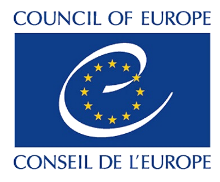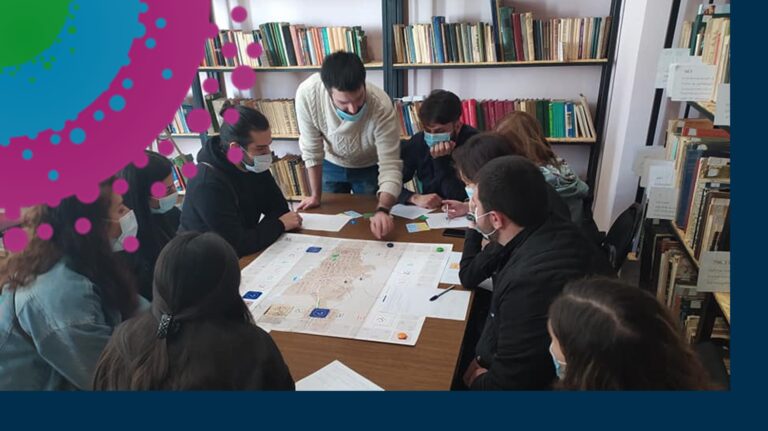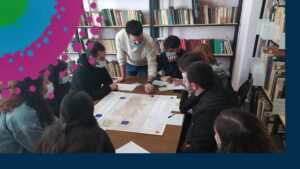Current status
Submitted
Discover more
After a contribution is submitted to BePART Forum, the initiative is marked as “Submitted”; as other partners involved in the initiative submit information from their side, the initiative is marked as “Under review” and goes through the validation process; twice a year, initiatives are validated by the BePART Working Group at the Council of Europe. Successful initiatives are marked as “Validated”. Do you want to learn more – click here
Contributor(s)
First contributor: Rustavi Innovations Hub Local Authority
Summary
The goal of the initiative was to increase the cooperation between the stakeholders in the process of solving the challenges and to strengthen inter-sectoral, co-financing processes through their institutionalization in Marneuli, Bolnisi and Dmanisi municipalities, in Kvemo Kartli region. Within the framework of the initiative, the municipal co-financing mechanisms developed and successfully implemented in Rustavi using the design thinking methodology were replicated in various municipalities. The process involved representatives of local self-government, civil society, education and the private sector. Following the establishment and institutionalization of co-financing mechanisms, together with NGO Orbeliani, local youth initiatives will be identified and funded with co-financing from the municipality and the private sector.
The initiative intends to achieve the following results:
- Inter-sectoral platforms for cooperation are created in Marneuli, Bolnisi and Dmanisi municipalities.
- Practical legal mechanisms for co-financing of local initiatives are established and adopted in the target municipalities.
- Co-financing and crowdfunding mechanisms are introduced in practice within target municipalities, that supports their institutionalization.
- Financing principles and mechanisms introduced in target municipalities are generalized to other municipalities.
Administrative level
Local (Kvemo Kartli region, Georgia)
Year of implementation
2020-2021
Policy area(s)
- Local Development and Planning
- Youth
Further details
/
Sorry, no records were found. Please adjust your search criteria and try again.
Sorry, unable to load the Maps API.
Rustavi Innovation Hub
Civil society organisation
Contact info
Tipology of involvement in the initiative
- Organising
- Implementation
Bolnisi, Dmanisi and Marneuli municipality
Public Authority
Contact info
/
Tipology of involvement in the initiative
- Participating with a direct involvement
Level of Participation
- Consultation
- Dialogue
- Partnership
Discover more
By level of participation we refer to the type of involvement in the decision-making process. The levels are identified by the intensity of participation: going from “information” to “consultation” to ” dialogue” to “partnership”. Do you want to learn more – click here
Developed practice(s)
/
Step(s) of the political decision-making process at which the practice was implemented
- Drafting of policy
- Decision – making on policy
- Implementation of policy
- Re-formulation of policy
Discover more
There are six different steps of the political decision-making process: agenda setting, drafting of policy, decision-making, implementation of policy, monitoring and reformulation of policy. Each step offer opportunities for CSOs and public authorities to interact. Do you want to learn more – click here
How the initiative was implemented
Situation
Initiative was implemented by Rustavi Innovations Hub, with support of UNDP Georgia.
The need to implement the initiative was linked to the lack of mechanisms for cooperation between the civil sector and local self-government and the low quality of dialogue in the target municipalities. Also, CSOs do not have the knowledge, experience and skills to gain the resources needed to carry out their activities. Rustavi Innovations Hub had interesting and successful experience in this regard, the replication of which would be important in other municipalities.
Activities performed
Creating of Inter sectoral working groups, discussing new co-financing mechanisms in working groups and adapting them to local needs. Also, representatives of the civil sector and local self-governments learned about the board game created by the Rustavi Innovations Hub, which aims to identify local problems and challenges and find ways to solve them. This board game is a good tool to increase the engagement process, especially among young people.
Tools and mechanisms applied
Design thinking meeting, using of design thinking methodology to adapt and implement successful experiences in other municipalities. A board game based on the principle of “monopoly” is also used to identify problems, it is fun and allows a high degree of involvement to be achieved. Based on the problems and challenges identified during the game, a competition of initiatives was announced, in which civil activists participated. For the competition was used the platform https://app.orbeliani.net/en. In total 10 initiatives were financed and implemented.
Goals of the civil participation initiative
At community level
Increasing participation and establishing new dialogue principles.
From Civil society organisation’s perspective
Increasing participation and establishing new dialogue principles.
From Public Authority’s Perspective
Increasing participation and establishing new dialogue principles.
Results expected prior to the implementation
Creation of a new mechanism of implementation of local initiatives by local activists.
Immediate results achieved after implementation
Creating a new co-financing tool for local activists, which enables intensive cooperation of civil society organizations and activists with local self-government. Mechanisms have been established through which the self-government can support various civic initiatives. Civic groups also gained experience in community project preparation and implementation and crowdfunding.
Long-term impact
Participatory tools have been institutionalized under the project, which will ensure the sustainability of the project results and make civic activism more effective in the long run. Also, inter-sectoral platforms created within the project can be used in the future as mechanisms to solve different problems.
Practice lessons learnt (obstacles and solutions)
| Agency (i.e., political conditions/power structures) | Obstacles | / |
| Solutions | / | |
| Legislative | Obstacles | According to Georgian legislation local governments cannot issue grants to civil society organizations, which seriously complicates the acquisition of resources for civic activism. |
| Solutions | The co-financing program developed within the project and implemented in 3 municipalities enables civil activists to receive additional resources from local self-governments. | |
| Administrative | Obstacles | Municipalities do not have experience in managing the civil sector financing process. |
| Solutions | Within the framework of the project, the representatives of the self-government of the target municipality learned about the experience of Rustavi Municipality and introduced it locally. | |
| Socio-cultural | Obstacles | / |
| Solutions | / | |
| Economic | Obstacles | / |
| Solutions | / | |
| Human capital | Obstacles | / |
| Solutions | / | |
| Other | Obstacles | / |
| Solutions | / |
Further information
/
Self-assessment
The self-assessment presents the opinion of the contributor about on what extent the following principles for Civil Participation have been reflected in the implementation of the initiative/practice/case-study, ranging from 1 (min) to 4 (max) (N/A: not applicable, do not know)
| Openness | 4 |
| Explanation | The process of the project, the planned consultations were open and anyone could participate in them. |
| Trust | 4 |
| Explanation | Thanks to the fact that representatives of various fields were involved in the project activities and made their own contribution to its success, the trust was quite high. |
| Independence | 4 |
| Explanation | There were no attempts by any stakeholder to obstruct the project. |
| Participation | 4 |
| Explanation | The project involved representatives of the private, public and business sectors. In the process of preparing the documents created within it, anyone could express their opinion. |
| Transparency | 4 |
| Explanation | Project implementation was fully transparent. Its activities were covered by local media and organization. The platform https://app.orbeliani.net/ used during the project was created for transparency of the processes. |
| Accessibility | 4 |
| Explanation | All project activities, all documents created within it are fully accessible to any interested party. |
| Non-discrimination | 4 |
| Explanation | Any discriminatory moments were excluded from the moment of creating the project application. This is especially important given that it was implemented in a region densely populated by ethnic minorities. |
| Inclusiveness | 4 |
| Explanation | The project activities did not have any particular specifics that could have prevented inclusiveness. Also, inclusiveness was one of the main requirements for local initiatives funded within it. |
| Accountability | 4 |
| Explanation | Reports on project activities were systematically prepared to the donor. Information about all its activities was also posted on the Facebook page of the organization, as well as on the media channels of the target municipalities. |
Thank you for wanting to share your experience on the BePART platform!
Learn more about the submission process, or just fill the form below.



